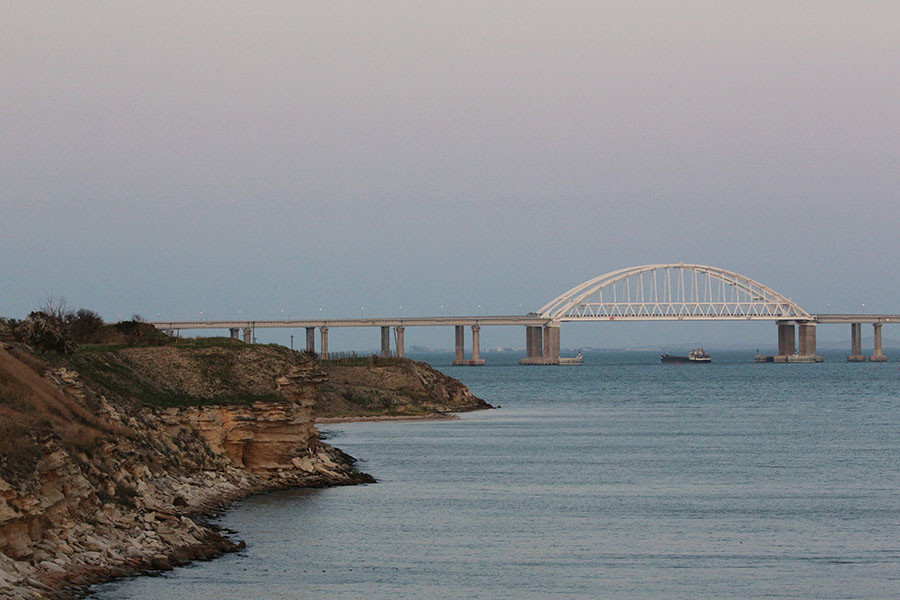In Ukraine, they called on to negotiate with Russia to establish a maritime border. Such an initiative was made by the state agency Hydrography (part of the country's Ministry of Infrastructure).
The ministry claims that the Treaty on the Russian-Ukrainian state border was not able to resolve this area. In this regard, the department proposes to create an international commission to launch “forced” negotiations on the definition of borders - delimitation.
“Taking into account the norms of international maritime law and consultations with leading international experts on maritime delimitation, we suggest considering the possibility of initiating a compulsory negotiation process with the Russian Federation on the establishment of the maritime border,” said Alexander Shchiptsov, head of the State Hydrography.
The agency cites Australia and East Timor as an example of "conditionally" forced "delimitation" of borders. Between the countries there were disputes about the borders, which were resolved only in 2018. On the initiative of East Timor, a delimitation commission was created, the results of which were taken into account when concluding an agreement between the two countries.
However, it is worth noting that, in fact, this process was not so simple as it seems at first glance. The dispute of these states was resolved only after its consideration by the arbitration in The Hague.
According to the first deputy head of the State Hydrography Bogdan Ustimenko, it is unlikely that Russia will “voluntarily sign” the border agreement, but the commission’s conclusions will be of some significance in the future.
“Today, Russia is unlikely to voluntarily sign a delimitation agreement with Ukraine (like Australia with Timor), but the written conclusions of the international delimitation commission will have very serious political and diplomatic significance, and will also be the basis for concluding an appropriate agreement on the delimitation of the maritime border in the future. between Ukraine and the Russian Federation after a change in the political situation in Russia, ”Ustimenko’s words are quoted on the agency’s website.
At the same time, it is noted that without establishing such a border, Ukraine “will never be able to fully exercise its sovereignty” in a significant part of territorial waters.
It is worth noting that between the two countries there is an agreement on cooperation in the use of the Sea of Azov and the Kerch Strait, which regulates all issues related to these waters. It notes that the indicated sea and strait are internal for both countries, as it has developed historically.
- Crimean bridge across the Kerch Strait
- RIA News
- © Max Vetrov
In Ukraine, in recent years, it has repeatedly stated its intention to break this agreement. The Russian Foreign Ministry emphasized that this will affect both countries.
“If they make that decision, it's their business. Naturally, this will entail certain consequences for both Ukraine and Russia, ”said Andrei Rudenko, director of the Second CIS Department of the Ministry of Foreign Affairs of the Russian Federation.
“Coercion is an excluded thing”
There can be no talk of any coercion with respect to Moscow, Valery Vanin, an international lawyer and honorary lawyer of Russia, said in a conversation with RT. He emphasized that such issues could be resolved within the framework of existing agreements.
“From the point of view of international law, since there are agreements between Russia and Ukraine, it is possible to raise some questions within the framework of these agreements. Coercion is an excluded thing. Due to the fact that each state has sovereignty - both Russia and Ukraine, there is no such international legal mechanism to enforce any decisions, ”the lawyer explained.
In this regard, Vanin came to the conclusion that this initiative of the Ukrainian department is aimed at trying to again raise the issue of the Crimean peninsula. Recall that the region reunited with Russia in 2014 according to the referendum.
“This initiative is aimed at trying to identify the sea borders of Ukraine without taking into account the entry of Crimea into Russia. Thus, they want to aggravate the issue once again, to create an informational occasion around a topic that is no longer interesting to everyone, ”the lawyer emphasized.
Any questions regarding the establishment of borders between Russia and Ukraine should be resolved in a dialogue, rather than coercive, said Vladimir Shapovalov, deputy director of the Institute of History and Politics of the Moscow State Pedagogical University.
“Russia is always open, the Russian Federation is a country that prefers to conduct dialogue, negotiations with all states in the world, if certain situations arise. On the contrary, it was Ukraine’s position in recent years that was unconstructive, and Ukraine presented itself as a non-negotiable state. In this sense, the actions of the Ukrainian authorities, both the previous leadership and, unfortunately, the current one, indicate incompetence and inability to the negotiation process, ”the expert said in an interview with RT.
Shapovalov is convinced that such a statement is part of Ukraine’s anti-Russian rhetoric.
“I think this is an element of informational noise from Kiev, informational attacks that come from the Kiev authorities and are part of the information campaign against Russia,” the analyst concluded.

